A Conversation with Passiflora
December 10, 2012 § Leave a comment
from the December 2012 issue of La Cadena (coming soon)
“DON’T LET THEM PAY FOR ANYTHING.”
The thought flashes across my mind, just for a moment, before I discard it as a bad idea. For starters, monthly expenses are high, having transformed me into an artist of the fortuitous drop-in.
“Hello how are you doing! Oh I’m sorry I didn’t mean to interrupt your [insert meal of the day]. I’ll come back later. What? Would I like to eat with you? Well, if you must insist….”
For starters, I’m on a tight budget, (can I get an Amen?) and working for La Cadena isn’t exactly a money-making scheme. But I’m nervous about the upcoming interview with San José-based Passiflora. I’ve never interviewed a musical group before, let alone anyone outside of my familyor my community of Cerbatana. I’m nervous, like a kid who’s about to have his first kiss but doesn’t know where to put his hands or a kid on his first date, wondering if I pay for dinner and the movie or…I just don’t want to screw up.
Fearing complete and utter failure, the likes of which will surely be passed on by oral tradition and remembered within the world of music journalism forever, I desperately consult my bible of sure-fire journalisticpractices, the Cameron Crowe film Almost Famous, for other advice.
1. I am The Enemy.
2.I will not befriend them, but if I do, I will be brutally honest and ruthless.
In fact, I shall complement their folk-rock musical styling as ‘incendiary.’
Yes, yes this’ll go swimmingly…
I meet Mariana Echeverria and Martha Palacio at Restaurante Jardindel Parque, where we are briefly joined by Mariana’s adorable infant son. Between the familial presence and Mariana and Marta’s charming and quirky dispositions, my novice apprehensions and journalistic pretensions quickly disappear. After introductions are exchanged and a brief reference to their performance at the All-Volunteer Conference in 2011, we settle in. For two hours, we converse about the beginnings and evolution of Passiflora, musical influences and the creative process, balancing local and global sensibilities, the emergence of Costa Rican identity and the burgeoning art and music scene in Costa Rica.
LC: So, Passiflora. How did it all start? How did you come up with the band name?
ME: I had been in a band before Passiflora, me and two other women. We would all write our songs then perform together, but it wasn’t really like a collaboration. We went our own ways, though we’re all still good friends. I continued writing songs and I started playing with my friends. At the beginning, it was Christine [Raine], Tanya [Raine], Ana [Gaspar] and me. Martha, my brother [Alejandro Echeverria], [Manuel Mora and Hector Morales] came later…We’re all family really.
MP: I wasn’t there at the beginning. I’m a friend of Christine’s and I was helping to take care of Mariana’s son during a practice, and I said whoa, I want to be a part of that! How do I sign up? For me, the lyrics are what got me involved in the project, because, in Costa Rica, I hadn’t heard a group with lyrics that were so deep with harmonies, it was so original and different. I had never sang before Passiflora, most of us haven’t studied music before, and what’s great about [Passiflora] is showing people if you want to do it, to sing and create, just do it.
ME: With the band name, I was talking to Ana, and she was like, you know you should name it after a flower. That would be perfect because it’s very feminine. And I was like, ‘Yes, yes, yes!’ and this other day, this guy was talking about the passiflora, how it was a beautiful flower, and [Ana] goes, that’s it! Let’s call it Passiflora. And I’m like, OK Ana, whatever you say [laughs].
LC: So it really sounds like Passiflora is a family project. Does that influence how you record?
ME: Well, Noches en Vela was recorded at home. That was the first time we recorded anything. I did the editing because my friend, he gave me this program, and I was pregnant at the time so I had a lot of time for myself, so he taught me how to use it. He actually mixed it, did the equalization and mastering and all that…So people would come over and we’d record, which meant someone would have to watch over my son…..actually, everybody has to pitch in a lot.
MP: Yeah, we’d relisten to the recording and you can hear Diego [saying], “Mommy mommy!” and we’d go Shhh! But it’s all home made. When we heard the last version of the song, we were like, [gasp]. We couldn’t believe it! That sounds good…oh god, I don’t know if I’ll ever have that feeling again.
LC: Do you prefer recording music or performing?
MP: Well, I would say it’s a lot harder to record, because when you’re recording, you try to do it the best possible. And it’s not that you don’t do that on stage, but on stage, there’s adrenaline and the crowd and you just give 100% one time, not again and again and again.
ME: Yeah, with recording, you’re more perfectionist; while live, it’s more about the feeling. Recording should be about the feeling too and you can hear that, but you do it many times, there’s usually just one guy listening over and over, rather than someone sharing the music.
MP: Also, we record one by one and it’s not like we’re all together on stage and we can see each other…
LC: …and you can feed off each other’s energy.
MP: Yeah that’s the difference. But at least with recording, you get a lot of feedback, like you can hear your voice and find out what you’re doing well, or not so good…
ME: I think we were all musicians who didn’t study music so any chance we have to learn more…we appreciate it so much. And we all work, we all have jobs, and I have 2 kids…I haven’t formally worked for a year…it’s something we do very passionately, because it’s you know, there’s nobody supporting us or anything. We do it, how do you say? con las uñas, with our nails, and I think it’s really authentic.
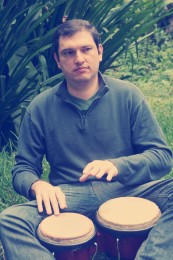
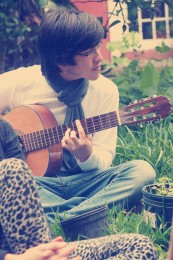
LC: So Passiflora is as much an exploration of personal creativity as it is an exploration of self.
MP: Yeah, totally. You know, we often joke that Mariana just randomly picked people off the street, like, “You! You can sing!” to be a part of Passiflora. But it’s something that’s great about the group, that we can inspire people to let go if you want to dance, dance; if you want to sing, then sing.
ME: Well, I really feel like I just got lucky, I really do, that I had friends who were also musicians.
LC: In Noches En Vela, you sing in three different languages, English, French and Spanish. Do you feel more comfortable singing in any one of the languages?
ME: Well, English is the easiest for me, for writing, because I have so much influence of music in English. In English it just happens. But I want to write in Spanish much more, because I want for the locals to understand me, because I feel like it’s a small group [right now], really, that can understand me. I will continue to write in English because it’s what comes most easily, but this [Costa Rica] is where I live, this is where I have to…make my name.
MP: Yeah the goal right now is to transmit in Spanish what we have in English. We had this concert where my whole family came, and it was great, they were the loudest and we were so happy to have them there but at the end my mom says, ‘really loved it but, what were you saying?’ She doesn’t speak any English. So we started thinking that we should really [write] more songs in Spanish.
LC: Why does English come so easilyfor you? Did you grow up learning English?
ME: Well, my mother raised me in English and my father is from here; I was born here. I wrote a lot of poetry in Spanish but the music I heard was mostly in English. My mother was transmitting most of the music because she was around more. I’m sure if I had two Latin American parents, I would have grown up listening to Spanish music.
MP: I grew up listening to more Spanish music because my parents are Colombian.
ME: I just feel it’s so important to be local. I was raised very cosmopolitan because my mom is half Costa Rican but her mother is French and my father has a background from all over the place…and so I felt kind of like a citizen of the world. I’m not a nationalist and I don’t identify to a language so much, so why should I sing in Spanish if it’s easier for me in English? But now I feel that if you live in a community, and you don’t have much of an opportunity to travel, and I don’t…I should be really local about this, like our food and our clothes should be more local, and we should buy from our neighbor and we should listen to the music our neighbor makes because that creates union.
MP: It’s really beautiful to communicate in different languages so you can communicate with more people. And you know, we think of ourselves as a marimba, it has all these different sounds, like our voices are these different sounds, but we don’t know how to play it, and we’re just discovering how to put it together.
LC: Who are your musical influences?
ME: From childhood, Paul Simon and for harmonies, Peter Paul & Mary. Bjork is like my goddess.
MP: Yeah Bjork is …beyond.
ME: More underground influences…Coco Rosie and The Knife.
MP: I grew up listening to Latin music, like Souza, who sings about the people and has lots of drum.
LC: Is there a strong music community in Costa Rica?
ME: It’s been slowly moving, but for whatever reason, it has really exploded the last three years. I don’t know why but it’s been very exciting to be a part of it. You know, before, I think [Ticos] were more insecure. We’re thought of as the happiest people in the world, but it wasn’t like that. We didn’t really have a strong identity. But lately, there has been more support for Costa Rican groups. Music has always been around [in Costa Rica], but not the support.
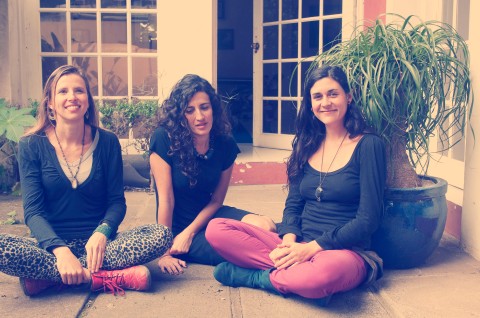
LC: Do you have any upcoming performances planned?
MP: We’re trying to get into Festival Internacional de las Artes for next year and TransitArte again, which is here in Parque Morazán where we can play for whoever comes through the park.
ME: We’ve been working so hard lately that, with the time left in this year, I don’t think we’ll do any concerts. We’ve had so many musicians come in and out of the band, and we’ve just figured out who we want, so now we’ve focused on practicing together, you know, trying to build….cohesion. Also Manuel is mixing some live footage, which has old and new songs, so it’ll be an LP.
LC: Are you working on any new songs? Is there a deadline for when they’ll be ready?
ME: Well now that you mention it, we should have a deadline…but I have about 8 songs that I’m working on, and Ana has a song that we need to get up and running
MP: I think were concentrating on recording [older] songs and were practicing a lot.
ME: And when they’re ready, they’ll be available on our website, passiflora.bandcamp.com.
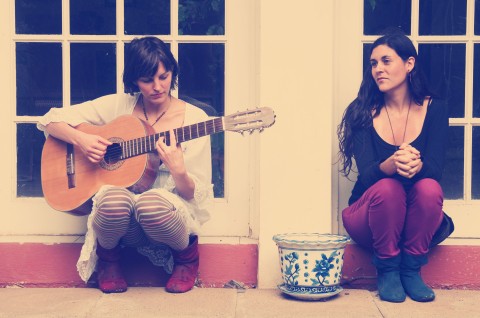
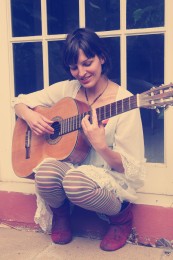
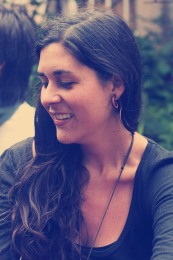
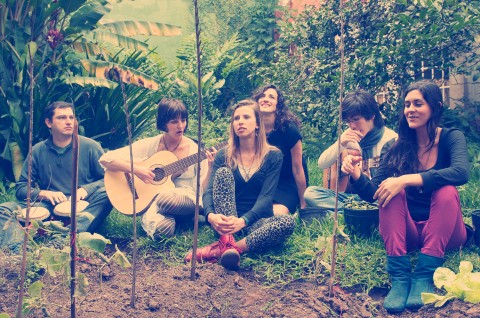
Leave a comment